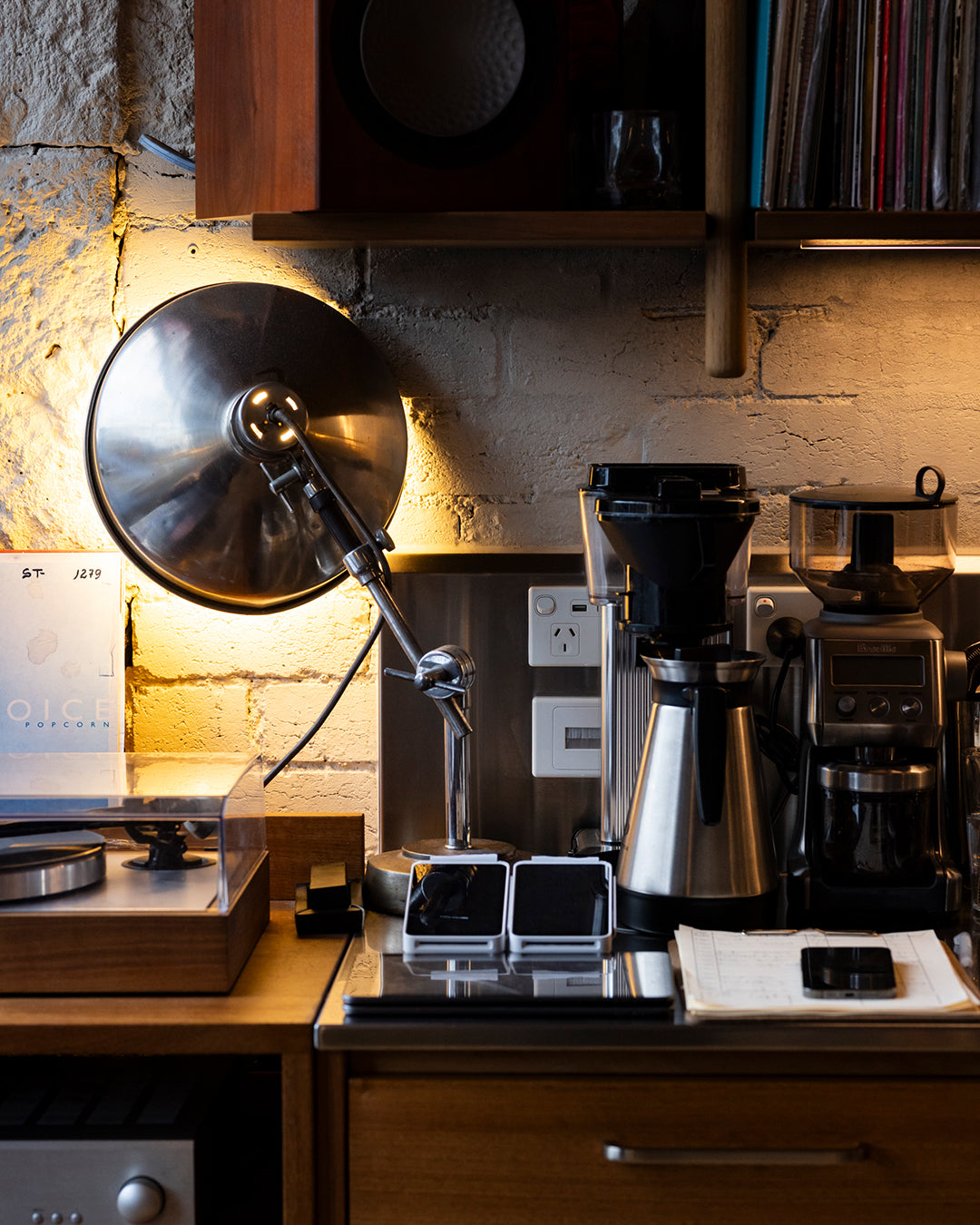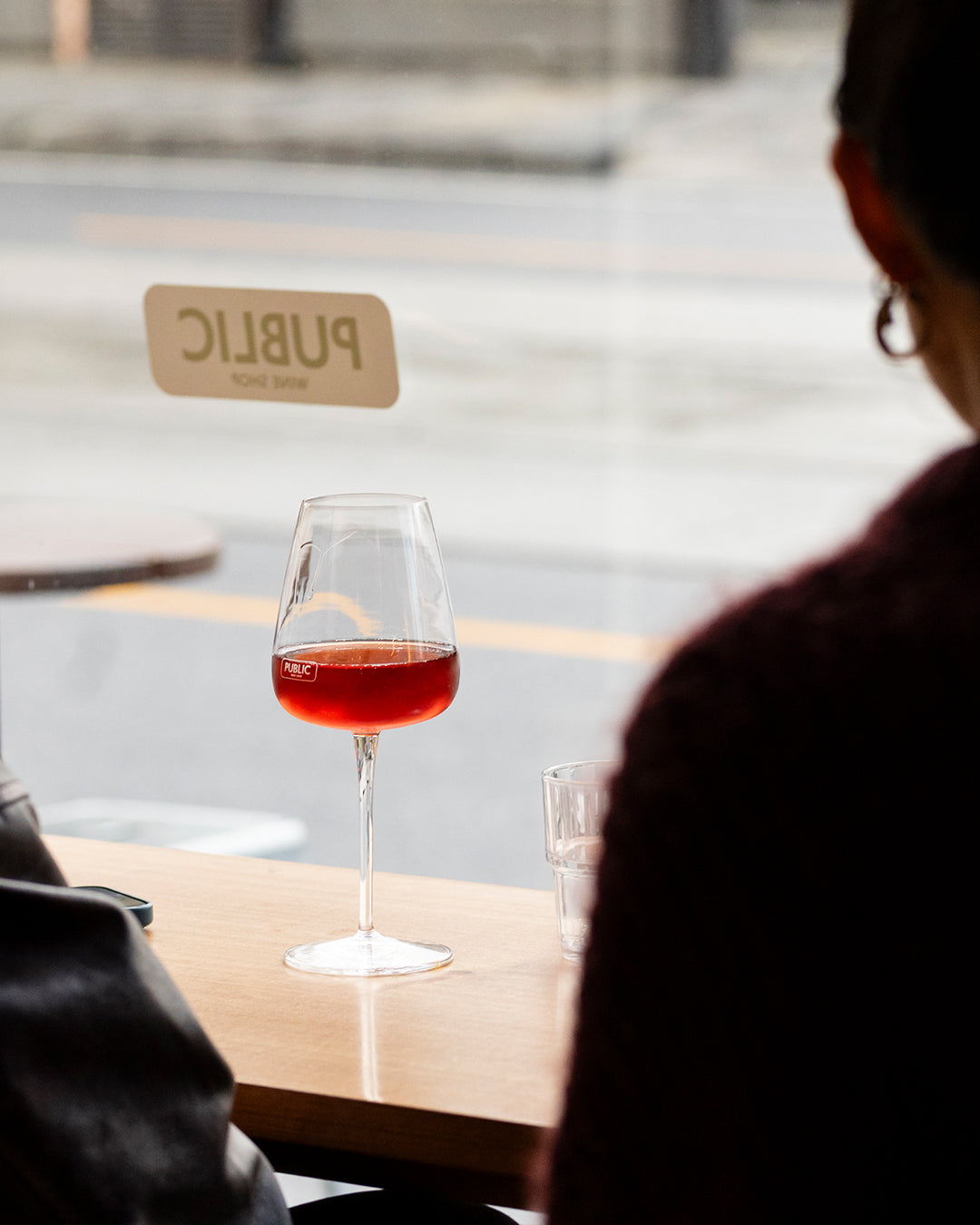Coffee with Campbell Burton of Public Wine Shop
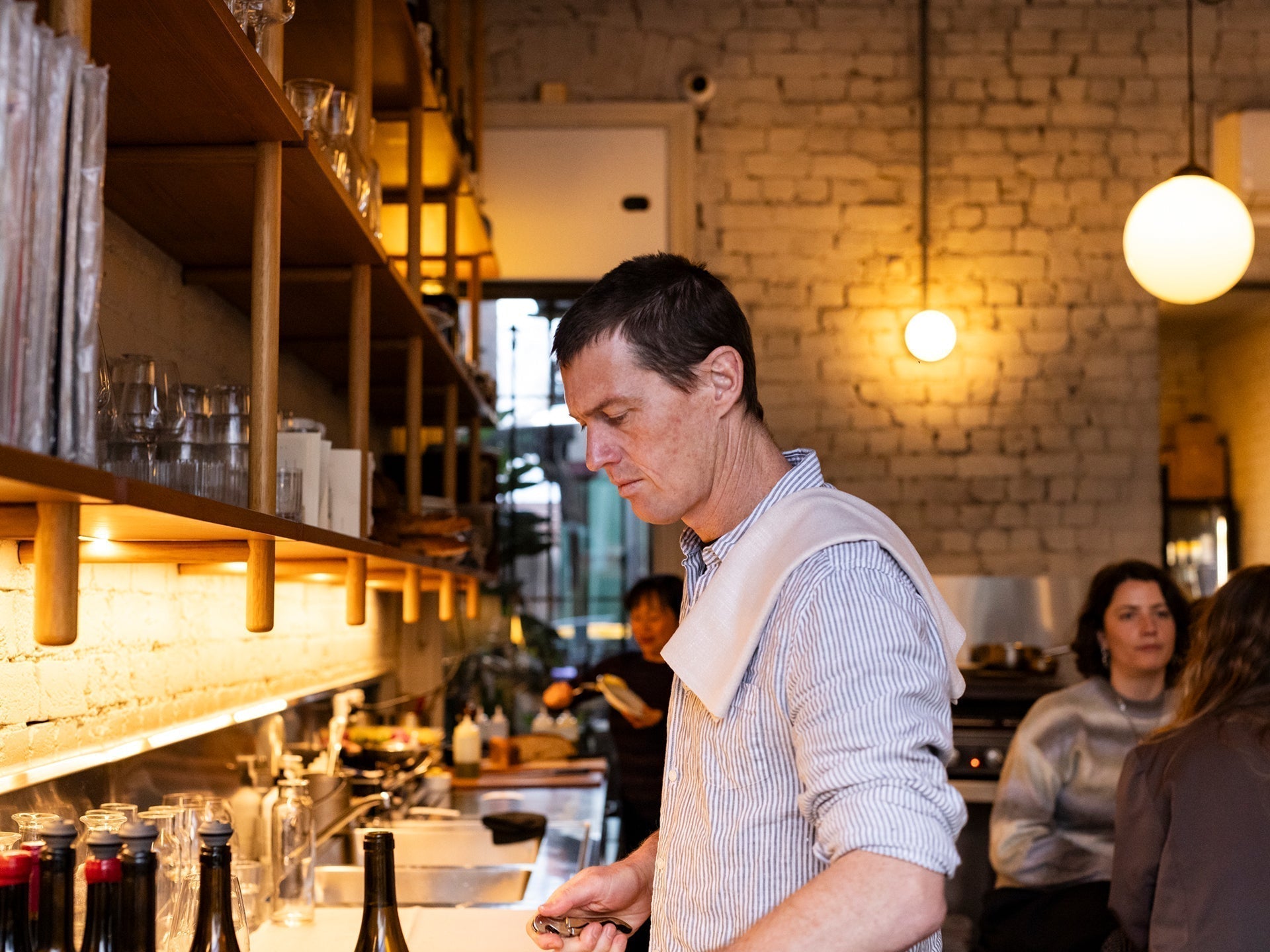
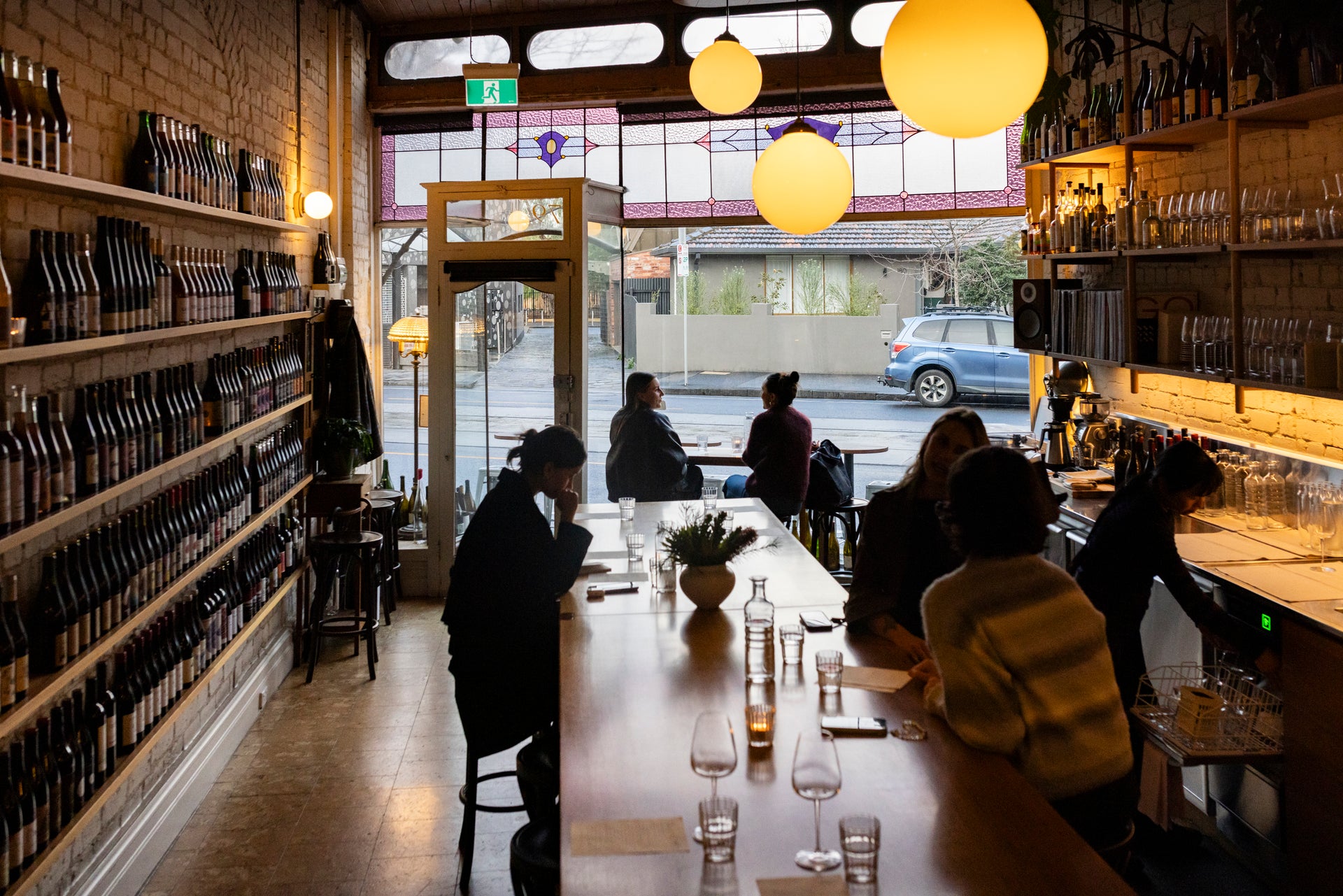
Market Lane: Can you tell us a bit about your journey into wine, and how you got to where you are now?
Campbell Burton: If I go back to the start…I did something totally unrelated at university. I did two and a half years at uni and then went travelling. This was 2003. I went to work with my two stepbrothers in New Zealand with horses and, while I was with them, I met Amy Hopkinson, who was just finishing a wine course at Lincoln University just outside of Christchurch. Amy and I became great mates.
I went on to work in hospitality, both in Australia and New Zealand. I remember hearing some really interesting snippets on the restaurant floor about wines and old vines. I love being customer-facing and telling stories, and I received a few anecdotes about wine that piqued my interest, and that I could translate to my work on the floor.
Then, in 2005, I was living in Europe, working in construction between the UK, Germany and Austria – it was really just a traveller’s job. At that time, Amy Hopkinson was working at a winery in Spain. She said, “I’m doing harvest if you want to come down for it.” I said, “Of course, I’d love to!” I worked with her for the long harvest in 2005, and then again in 2006, and she became a real mentor. I was splitting my time between the winery in Spain and working in hospitality in the UK. I found that all the information I was getting from working in a winery was so valuable to have back on the restaurant floor.
So that’s how it all got started. But incidentally, by the time my UK visa ran out, all I wanted to do was go back to London and learn how to roast coffee.
Ah, really?!
Yeah! I thought, wine’s great and pretty interesting, but trips to Monmouth Café in Borough Market sparked an interest in coffee and made me think, “Far out, this is just the coolest industry.” So, I went back to Australia and tried to enrol in coffee courses. I ended up working at City Wine Shop in Melbourne and it was there that I realised I didn’t know anything at all about wine. I thought, “Actually, I haven’t even scratched the surface here.” And I’ve been working in wine ever since.
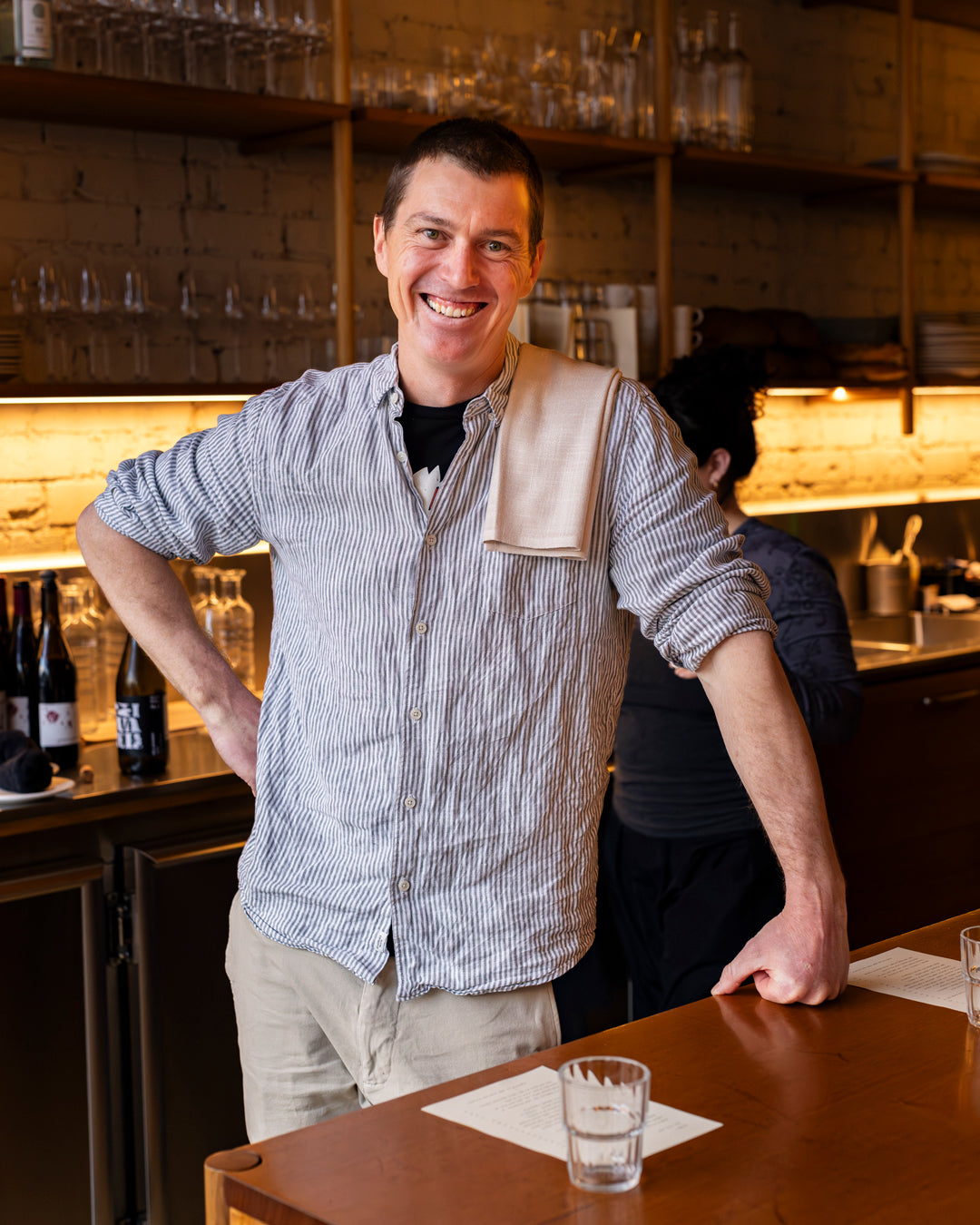
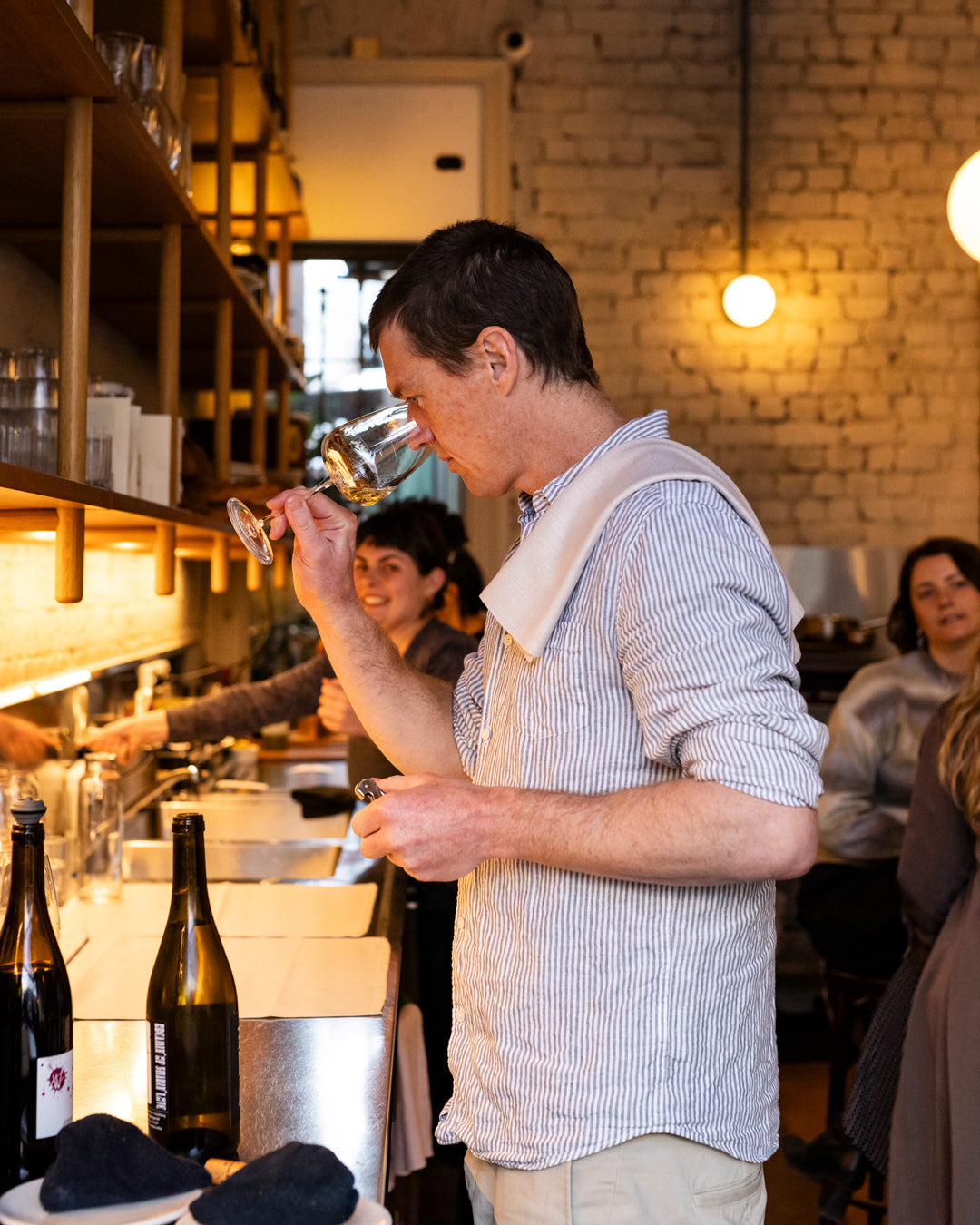
When you’re sourcing wines from all over the world, what are the most important things you look for?
Halfway through my wine journey, I was introduced to organically sourced wines with nothing added to them. When you’re working in the world of wine and from a front-of-house perspective, every single person values their ability to judge why a wine tastes the way that it does. But when I first started to taste these wines, from every single aspect that was sitting in the glass, I found them really difficult to describe. I thought, “I don’t know why it feels like that, smells like that, tastes like that. I’m transfixed by this. I have to know, like at a chemical level, why this thing tastes the way that it does.”
Professionally it’s a little bit daunting, when it’s your job to explain that to a customer, when you go, “I don’t actually have the language for this.” I realised then that it was a really significant part of my learning, because there was so much I didn’t yet know.
I became more and more fascinated. I went and did a couple of vintages with [Australian winemaker] Mac Forbes and had a go at making some wine, as well. I started to realise just how difficult it was to make a wine with nothing added to it at all, and I wondered what sort of magic these extraordinary people were using in a winery to make this stable and correct wine (because when I tried to do it, everything turned to vinegar straight away).
Over the course of time, I started to have an inkling that I wanted to be importing wines. And then my partner, Charlotte, and I did some vintaging in France – in Burgundy in 2011 and the Loire Valley in 2012. I was learning, slowly, bit by bit, what was necessary and what was possible from a farming perspective. But it wasn’t until 2013 when Charlotte and I did vintage with Claude Courtois in the Loire Valley that I realised there was actually really no magic in the winery at all; that the magic was happening in the vineyard.
So, for example, those were pretty iconic wines but made in a really uncelebrated, sleepy corner of the Loire Valley. And one of the most significant things I saw was that we were picking fruit in the morning and then we’d get into the winery let’s say two hours later. There was no machinery in this winery at all, just old basketry, and all the fruit that we’d picked two hours before was already sitting in the press, fermenting.
In all the wineries that I’d ever seen – in Spain, in the Loire Valley, everywhere – I’d never seen fruit just come into the winery and start fermenting straight away. The point of that is that when something starts fermenting straight away, it’s looking after itself, it’s like anti-oxidating. And I realised that this was the result of, like, three decades of organic farming on this site. I thought, “Oh wow, okay this winemaker’s a real extremist; a purist.” It was a real lightbulb moment. Charlotte and I weren’t even there for long, it was about ten days, but from then, my path just became very, very clear. I knew that when we started importing, we would only import wines that were organically farmed and had nothing added to them at all. And so that became a steadfast rule from the outset.
We returned to Australia and every night, after working at the Builder’s Arms, I’d come
home and just research (if I’m being honest, I still do that to this day). I discovered this whole underground network of people in France without websites or social media or even email addresses. A network of extremists, basically – from an environmental perspective, they were absolutely uncompromising, and uncompromising in the winery as well. What they were bottling had to be organic and had to contain nothing but fruit.
Was it specifically French winemakers that were leading this movement?
No, there have always been pockets of this everywhere, but it’s more well-known in France. If you look at where we’re at today in the world of natural wine, it has essentially become mainstream, which is great. That was kickstarted in France, but widely supported by interesting producers in Italy and, of course, Georgia. If you look at how people have been making wine in Georgia, this is not a new thing – to get some grapes and ferment them and bottle them with no additions. And there are pockets of rural Spain where people have just never used chemicals, have never thought to add anything to the wine.
It’s the traditional way of doing things.
Absolutely. Most of the wines we’re exposed to when we’re growing up – like the first wines that we taste – the cultural driver for making those wines is money. If you’re buying wine from the supermarket when you’re at university and the wine costs $8.50, that project is a money-making project. I didn’t realise until going to France that, at a cultural level, what people were valuing by getting out of bed and going to the vineyard was totally different. There’s no financial planning – the number one driver is quality. And it’s hard to make money like that.
Because it can only be done on a small scale?
CB: Yeah, exactly. And I don’t know many people who, if that’s their mentality, also have the mentality to say, “I need to charge”. Whether they’re a jewellery maker or a saddler or a winemaker, most of those people say, “I just want to do the best job I possibly can.” Often, they don’t know how to charge enough for their work. Some people can and they say, “Cool, I made this ring and it took me six months to make it and I’m going to charge you $60,000 for it.”
But it’s hard in a market when they’re competing with producers on a mass scale who are just churning it out.
Exactly and so, broadly speaking, those people who are proper artisans in France and just want to make an amazing product that’s uncompromising, they don’t make cheap products, but they also don’t make them very expensive.
Back to your question…when we’re sourcing wines, for us to approach a new person, typically what we do is use these websites we’ve discovered and our existing network we’ve got and a new name might pop up that we think aligns with the people we work with – people that make all their wines with zero additions and farm organically and, by and large, only bottle wines they’ve farmed themselves (I’m not dogmatic on that as a rule but most of the people we work with farm their own fruit).
I haven’t been to Europe since 2019 (initially because of Covid but also because our family’s growing now) but, generally speaking, we go and meet the producer on the next trip to Europe and then see if we basically get along, and if we like the wines, and it starts like that. And if everything aligns and we see it being a good relationship, we’re passionate about the wines and passionate about the stories, and the vineyard’s amazing, and economically it feels viable, we give them an order and get started like that.
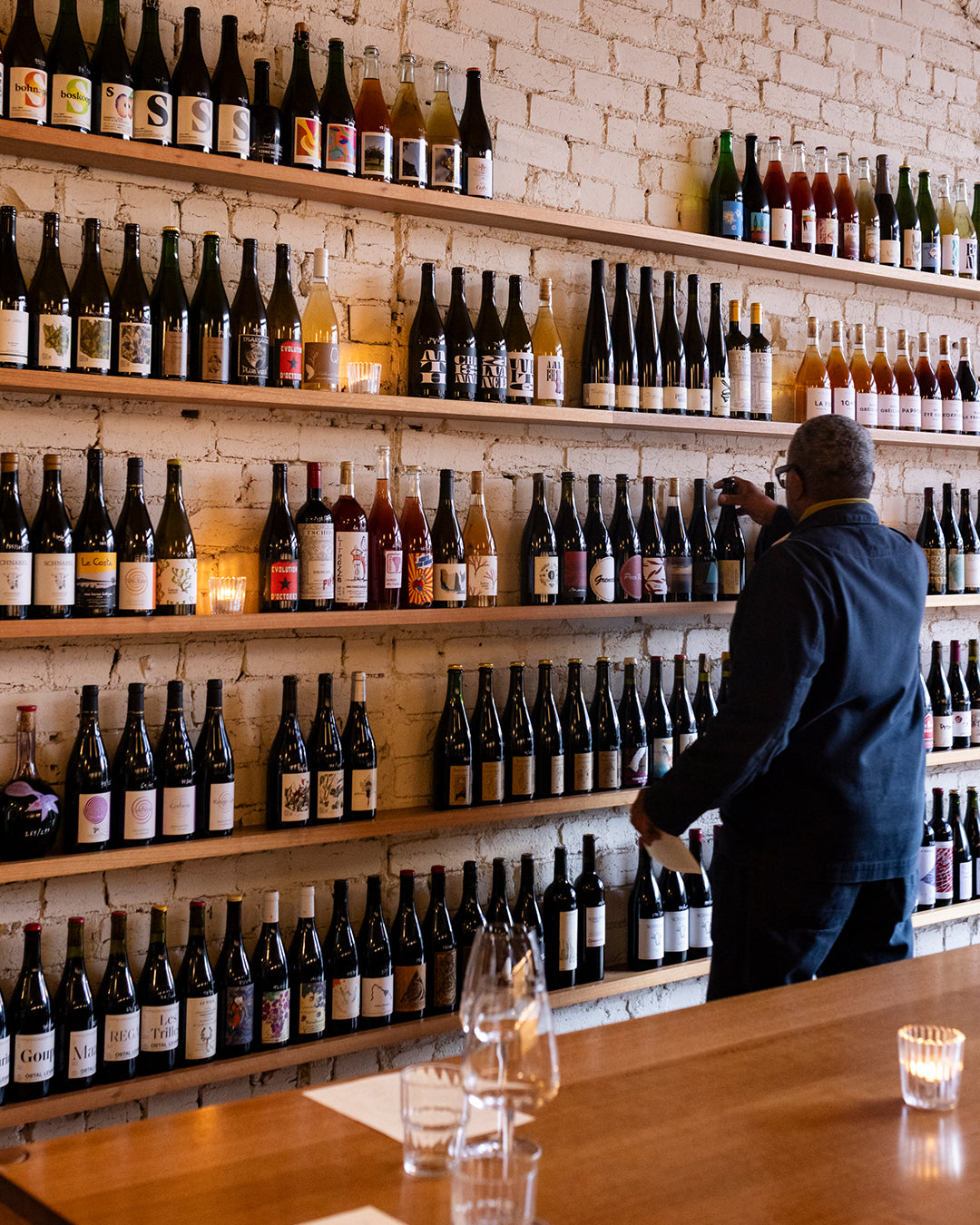
"I knew that when we started importing, we would only import wines that were organically farmed and had nothing added to them at all"
Are there any producers you’re particularly excited about at the moment?
There’s a guy called Andi Weigand who’s based in a region called Franconia in the southern part of Germany. He actually approached us; it doesn’t always happen like that. Typically, we would approach a producer and either buy a mixed case from them and have them shipped here or indeed go and meet them next time we’re over there. But Andi got in touch with us in 2023 and we spoke for about a year. Then, last year, we bought a case from him to taste here and they are some of the most riveting wines I’ve ever tasted.
He’s got ten hectares that he’s taken over from his father, spread across 40 sites. So, 40 very small vineyards that make up ten hectares. And the soil he’s working with there is a really interesting shell limestone called Keuper. It’s calcareous in nature, which makes it more alkaline than acid. I haven’t met Andi in person yet but he’s young and serious and he wants his wines to be very correct, very classical and well-made.
At a cultural level, what he wants is for the wines to be able to span markets. So, you can sell them to a really high-end gastronomic restaurant but also at a wine bar in Paris. When you’re farming really well and making the wines very correctly, that is totally possible. Most people would taste the wine and say, “Yeah it just tastes like a wine with a lot of flavour, and it’s got texture and richness and density, like a lot of information and matter on the palette.” For me, that’s where the greatest quality is.
The reason that I’m so excited about these wines is that the flavour’s great, initially; they’re very well made, very correct, they express their site really well. And what that soil does…if you think of wine as a shape, the soil makes it like angular and really focused and direct on the palette. You can get chalkiness and rockiness in the wine, but it’s not what I would describe as being mineral, it’s not what that soil type does. So, it’s not dissimilar to what the soil in Champagne does to a wine, but as opposed to giving it base and making it sit down on the palette and giving it like a glossiness and breadth and minerality, you don’t see that from this calcareous soil. You see different variations of this soil type in Burgundy, too, and it’s just unmistakable. You taste a wine and only that soil type at a chemical level makes the wine taste that way.
You can ship a living wine like that and, generally speaking, they’ll travel better and taste ready for sale faster than if the wine was grown on a more acid soil. It makes them more stable because it shifts the PH. And so it allows us to show wine to a greater breadth of customers. We can go to a
really high-end customer in the CBD and we can show them to a cool new wine bar in Darlinghurst.
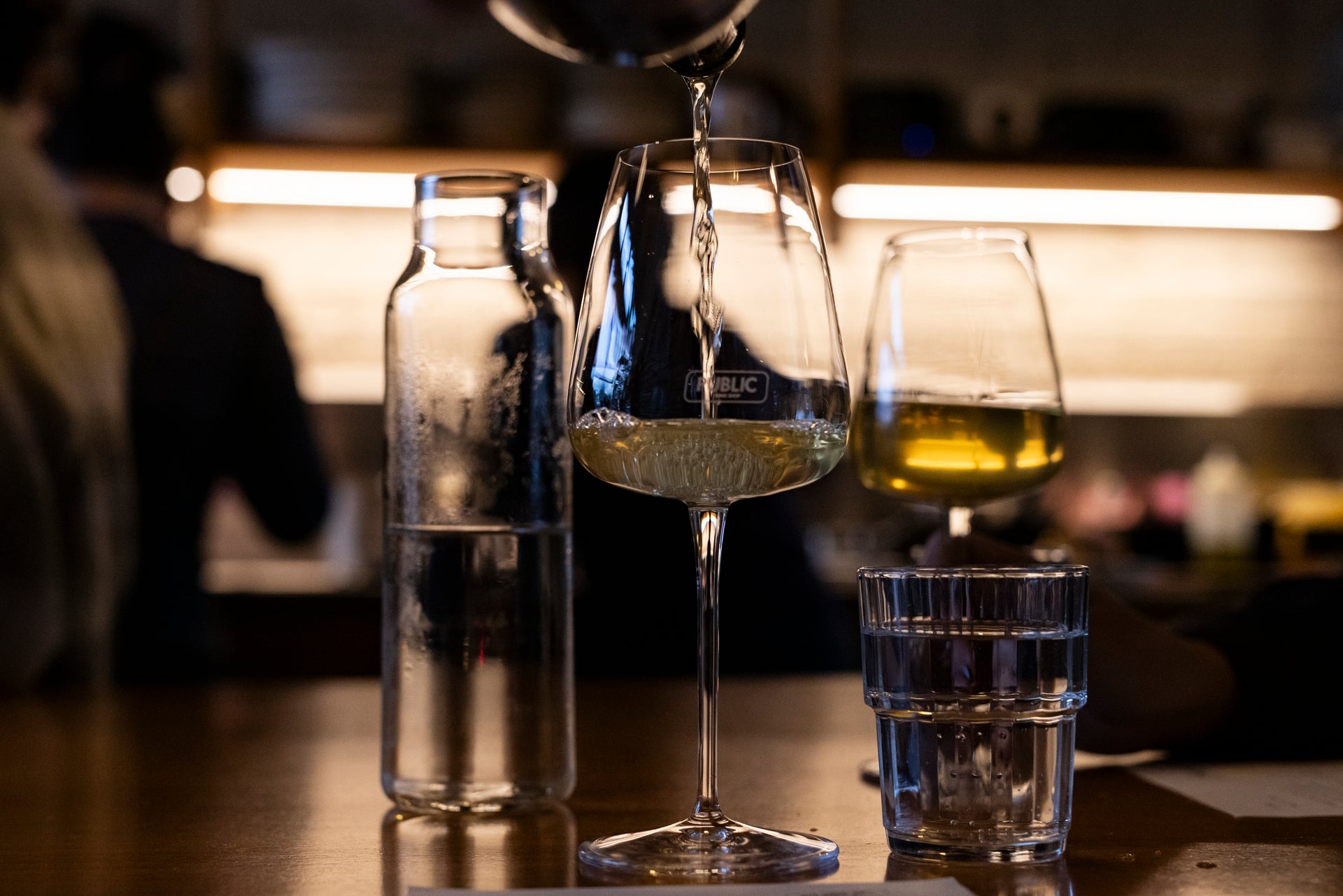
What initially inspired you to open Public Wine Shop?
Initially, I was inspired by some other venues – places like 40 Maltby Street in London, where you’ve got the model of an importer also having a bar. We had our hearts set on opening a venue at least two years before we even imported our first wine. The two pursuits kind of had to go hand in hand – because we wanted things to be relatively affordable and because I wasn’t working on a restaurant floor at that time, and I wanted to get back on the floor. I love wholesale but I love being on the restaurant floor so much. So, it was places like 40 Maltby Street and various places in Paris as well. There were levels of inspiration from overseas, and also from here in Melbourne and Sydney. It was a combination of things. But I really didn’t want us just to have our own bar, I wanted us to be importing as well. I’ll always be motivated by that, by the capacity to go overseas and select wines that aren’t yet available over here. That was a huge part because it’s just so much fun.
How do you go about creating and nurturing the atmosphere and culture at Public Wine to maintain the consistency that makes it such a beloved venue?
I feel fortunate that we had a very clean slate when we opened, and we opened with a really wonderful team. We’ve always had a wonderful team. We had a pretty clear set of goals in place before we even served our first customer. And again, this largely came from experience and inspiration from other venues. I’d worked in hospitality long enough and I’d seen enough, tasted enough inspirational food, seen enough inspirational service to say, “Okay, cool this is what I want this place to be.’
We had a goal in mind, and we had a really strong, clear briefing before we opened the doors, and that revolved around positivity. We have a clear set of principles that we don’t talk negatively about people or other venues or anything at all. Like if something doesn’t need to be solved by having that conversation and it’s not possible, then we just don’t do it. If something does need to be dealt with, we don’t look at that as a negative thing, but there’s a clear channel in place to deal with whatever that issue is, here in a professional context. So, from the outset we said, “This is a positive space” and that’s the number one guideline.
In addition to being a positive environment, we want to make customers feel welcome and special. At a technical service level, lots of people who work here have really high-end dining experience and so even though the style of service is not super formal downstairs, we want the team to have had enough experience to read customers. If you can tell that a person wants to have a more formal experience, then you can provide it for them without even having a conversation about it. We don’t have a hard-and-fast system about how to deal with every customer and situation, but it’s about ‘what is the right thing in that moment, for that person?’
This comes into play with the communal table downstairs. You can’t provide really classical, formal service with that table configuration, and so we basically just want to have a really welcoming style of un-intrusive service and, if you need something, then it’s up to us to have that ready before you need it. We want people to feel cared for, but not necessarily fussed over. It’s important to us that every single customer is treated like an individual. For us, that person is more important than our systems.
From a back-of-house perspective, we’ve always had a really strong insistence on working with really well-farmed produce, most of it organic. And similarly, building a strong culture there as well. Having a caring environment where the kitchen team feel free to cook food. It’s got to fit within the style of the venue and the hardware that we’ve got available but, beyond that, people can do what they want.
And obviously recruitment is a really critical part of shaping the customer experience as well, and we take that very seriously. It’s got to be the right fit. At a cultural level, experience level, you know some people have had decades of experience whereas others have had one year, but if someone at a cultural level is a fit for the venue, then it just makes everything so easy.
"It’s important to us that every single customer is treated like an individual. For us, that person is more important than our systems."
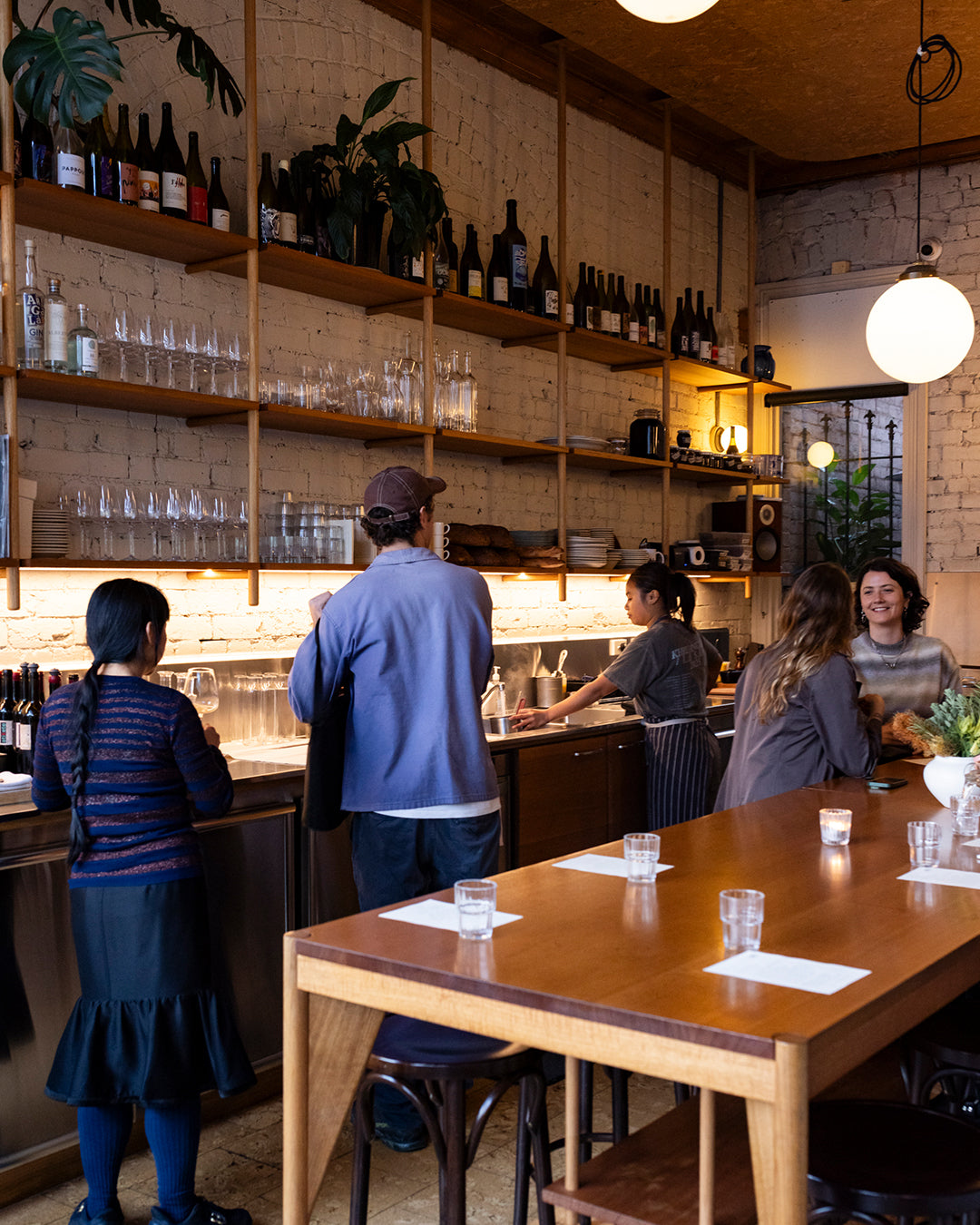
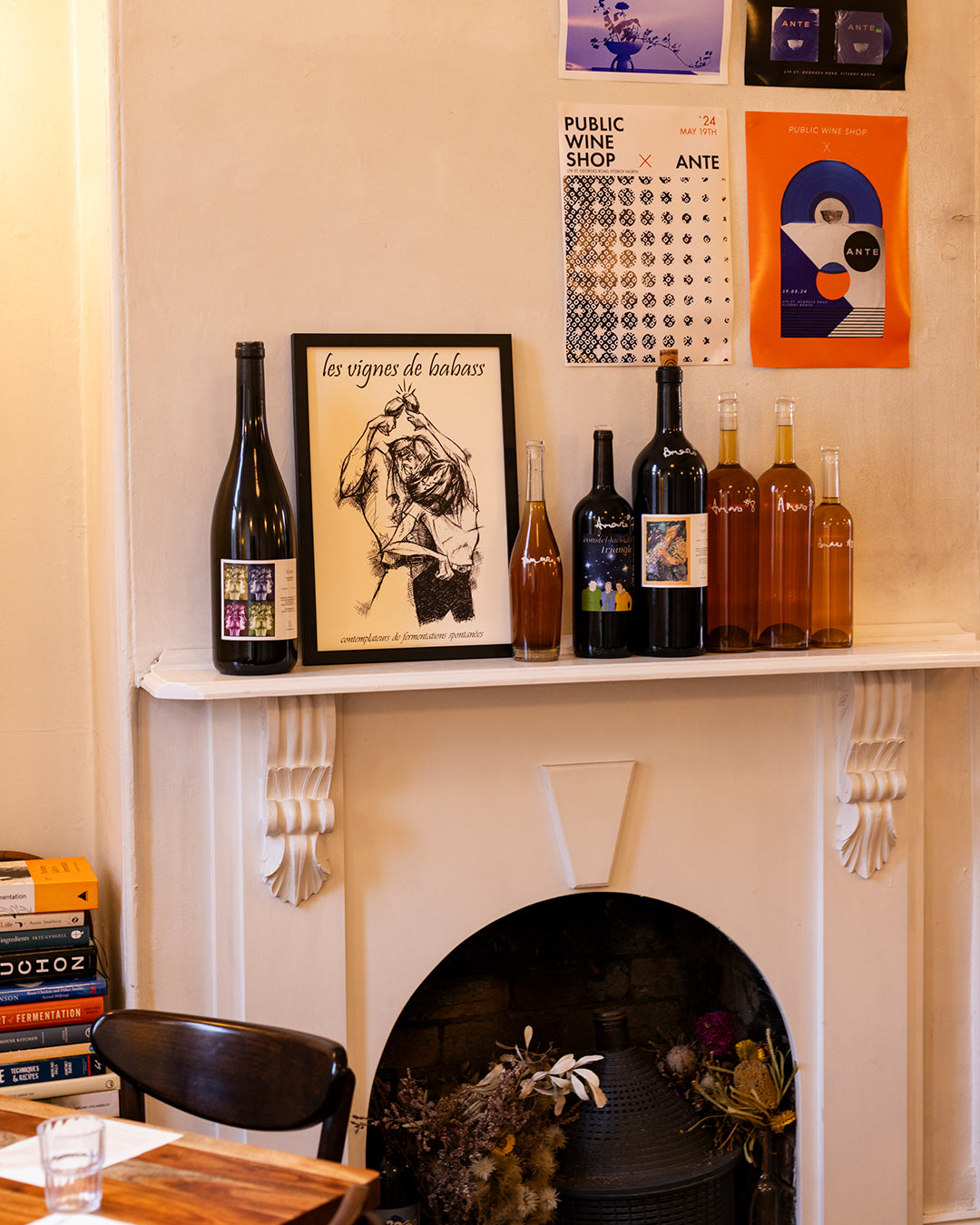
We’re thrilled that Market Lane coffee makes an appearance on your carefully considered menu! What place does coffee have in a wine bar setting like yours?
I was really determined about that. When we were working with our designer, Dion Hall, at the very initial stages of the drawing, he said, “I need a list of all the hardware you’re going to put in here. How many fridges? What style of fridges? What type of oven? What are the things that are going to be sitting on the surface counter downstairs?” So, we don’t have a kettle, we have very limited space, but for me it’s very important to have coffee in the building. I just think hospitality businesses revolve around endless cups of coffee!
We could have offered espresso but I couldn’t guarantee that we could do a really, really good job with it. But I thought, “We can get really good coffee from Market Lane and we’ve got filtered water and a Moccamaster, so we can make great-tasting coffee. We just decided that all we’re going to serve is black coffee, we’ve hardly even got any sugar or milk in the building, anyway. So, you can have a really transparent black coffee or…that’s all we’ve got!
Some of the best coffees I’ve had have been brewed with a Moccamaster. I can make coffee at home with a V60, really taking my time, being super careful, but it won’t taste better than the Moccamaster. Every cup of coffee tastes great. So, we’re really proud to serve it. We’ll have a few people every day who want a cup of coffee, but the staff drink a lot of coffee!
And our final question…do you have a favourite wine at the moment?
Coming back to that conversation about Andi Weigand – the 2023 Andi Weigand Silvaner, for me, at the moment, just has everything you want from a white wine. You’ve got the totally discernible evidence of crunchy green Silvaner skins and the focus and the direction that the Keuper soil gives you. It’s so pure, so focused with a really bright acidity. It’s a wine that you’d love to drink in summer, but the quality is so high right now, I just go, “Far out!” It’s pretty unforgettable. But an actual favourite wine? Obviously, there are hundreds.
